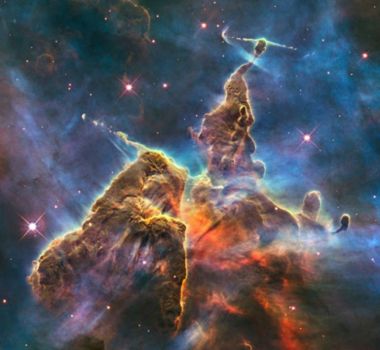NASA announce new discoveries about 'life beyond Earth': Have they found God?

Tomorrow NASA will announce important new discoveries in 'the search for life beyond Earth'. Have they found God?
It's a question prompted by an historic moment in man's search for the stars, celebrated today. On April 12 in 1961 Soviet Cosmonaut Yuri Garagin became the first human to travel into outer space, and perform the first manned orbital flight.
When Gagarin returned to Earth he reportedly reflected that in space: 'I looked and looked, but I didn't see God.' Another imagining of the quote has Gagarin staring into space simply saying 'I see no God here'.
It looks good on a poster, but Gagarin didn't actually say it. The line is a reworking of what Soviet leader Nikita Khrushchev said as part of the state's anti-religious propaganda.
For some, the line makes a snappy polemic and a cunning 'gotcha' moment: Imagine God lives somewhere just outside of Earth – go to space and 'ha! He isn't there!' Take that, theists.
It is somewhat amusing to imagine the creator of the Universe hiding-not-very-well in the spatial vicinity, perhaps camping out on the dark side of the moon, hoping he isn't rumbled by the invention of space travel.
But humankind's quest for the divine has never seriously been a question of getting to space and finding out where God lives. It's a quest that runs deeper – through the very human heart. To misquote a classic country ballad, Khrushchev was looking for God in all the wrong places.
When the psalmists of the Old Testament wonder at the beauty of the stars, they praise God – but they don't suggest that the divine is also up there among them. For them, God is the powerful, pre-existing creator – the one behind all things and beyond all things: 'the heavens declare the glory of God' (Psalm 19:1). Christian theology has twinned this idea – a holy, transcendent God far beyond our comprehension – with another: that God is also far closer than we think.
The story of Scripture is not so much one of man searching for God, but of God searching for man. As David declares in Psalm 139: 7-12:

'Where can I go from your Spirit?
Where can I flee from your presence?
If I go up to the heavens, you are there;
if I make my bed in the depths, you are there.
If I rise on the wings of the dawn,
if I settle on the far side of the sea,
even there your hand will guide me,
your right hand will hold me fast.
If I say, "Surely the darkness will hide me
and the light become night around me,"
even the darkness will not be dark to you;
the night will shine like the day,
for darkness is as light to you.'
The cosmic drama celebrated at Easter takes this even further. Through the incarnation, God himself becomes human, dwells with us, makes his home on Earth. The evangelist St John reflected on this mystery: 'No one has ever seen God, but the one and only Son, who is himself God and is in closest relationship with the Father, has made him known.' (John 1:18)
St Paul encouraged the pagan crowd at Athens that God is 'never far from any one of us'. (Acts 17:27) God isn't a distant, cosmic cloud-dweller waiting to be found somehow. In Jesus, God is the daring traveler, the pioneer, the savior – and he finds us.

What then of NASA's upcoming announcement? The space agency have promised important news about 'the search for life beyond Earth'. I'm guessing they haven't 'found God' (though that would be impressive) but they do have interesting discoveries to share about 'ocean worlds' within our solar system. Interest has risen in Jupiter's moon Europa, with speculation that its oceans may in fact provide stable conditions for life. NASA are otherwise playing their cards close to their chest, so before their press conference at 7pm GMT tomorrow, we can only wonder.
The search for 'life on other planets' can make some Christians nervous, since the Bible doesn't say much about other-worldly aliens. If intelligent extra-terrestrial life were discovered, would it shatter Christian faith? Would it undermine the idea that human begins are God's special creation as implied in the Bible? Vocal creationist Ken Ham thinks so, having argued that the search for life in space is pointless and 'driven by man's rebellion against God'.
Others are more optimistic and open. Christian theology after all, doesn't say that humans are special because they're at the centre of the universe, but because they're recipients of God's grace. As David wrote in his psalm, it's the gift of life and relationship with God - not our place among the planets - that gives us value.
As for exploring, Christians have frequently led the way in the search for the unknowns of our Universe. The quest for knowledge and the exploration of creation can bring us wonder, beauty and crucially – humility. In space, you can find God – but not in the way that Khrushchev imagined.
When we look to the heavens, we don't need space-exploration to tell us we're not alone. I'm excited about NASA's news, but Christian wisdom is clear: we've never walked alone.
You can follow @JosephHartropp on Twitter











